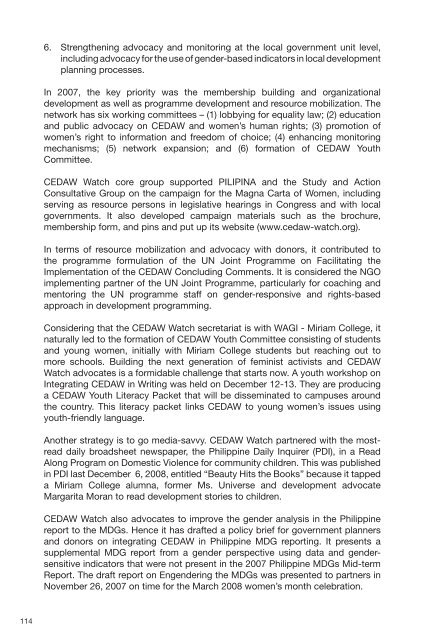Section 3 - Educating and Partnering for CEDAW
Section 3 - Educating and Partnering for CEDAW
Section 3 - Educating and Partnering for CEDAW
Create successful ePaper yourself
Turn your PDF publications into a flip-book with our unique Google optimized e-Paper software.
6. Strengthening advocacy <strong>and</strong> monitoring at the local government unit level,<br />
including advocacy <strong>for</strong> the use of gender-based indicators in local development<br />
planning processes.<br />
In 2007, the key priority was the membership building <strong>and</strong> organizational<br />
development as well as programme development <strong>and</strong> resource mobilization. The<br />
network has six working committees – (1) lobbying <strong>for</strong> equality law; (2) education<br />
<strong>and</strong> public advocacy on <strong>CEDAW</strong> <strong>and</strong> women’s human rights; (3) promotion of<br />
women’s right to in<strong>for</strong>mation <strong>and</strong> freedom of choice; (4) enhancing monitoring<br />
mechanisms; (5) network expansion; <strong>and</strong> (6) <strong>for</strong>mation of <strong>CEDAW</strong> Youth<br />
Committee.<br />
<strong>CEDAW</strong> Watch core group supported PILIPINA <strong>and</strong> the Study <strong>and</strong> Action<br />
Consultative Group on the campaign <strong>for</strong> the Magna Carta of Women, including<br />
serving as resource persons in legislative hearings in Congress <strong>and</strong> with local<br />
governments. It also developed campaign materials such as the brochure,<br />
membership <strong>for</strong>m, <strong>and</strong> pins <strong>and</strong> put up its website (www.cedaw-watch.org).<br />
In terms of resource mobilization <strong>and</strong> advocacy with donors, it contributed to<br />
the programme <strong>for</strong>mulation of the UN Joint Programme on Facilitating the<br />
Implementation of the <strong>CEDAW</strong> Concluding Comments. It is considered the NGO<br />
implementing partner of the UN Joint Programme, particularly <strong>for</strong> coaching <strong>and</strong><br />
mentoring the UN programme staff on gender-responsive <strong>and</strong> rights-based<br />
approach in development programming.<br />
Considering that the <strong>CEDAW</strong> Watch secretariat is with WAGI - Miriam College, it<br />
naturally led to the <strong>for</strong>mation of <strong>CEDAW</strong> Youth Committee consisting of students<br />
<strong>and</strong> young women, initially with Miriam College students but reaching out to<br />
more schools. Building the next generation of feminist activists <strong>and</strong> <strong>CEDAW</strong><br />
Watch advocates is a <strong>for</strong>midable challenge that starts now. A youth workshop on<br />
Integrating <strong>CEDAW</strong> in Writing was held on December 12-13. They are producing<br />
a <strong>CEDAW</strong> Youth Literacy Packet that will be disseminated to campuses around<br />
the country. This literacy packet links <strong>CEDAW</strong> to young women’s issues using<br />
youth-friendly language.<br />
Another strategy is to go media-savvy. <strong>CEDAW</strong> Watch partnered with the mostread<br />
daily broadsheet newspaper, the Philippine Daily Inquirer (PDI), in a Read<br />
Along Program on Domestic Violence <strong>for</strong> community children. This was published<br />
in PDI last December 6, 2008, entitled “Beauty Hits the Books” because it tapped<br />
a Miriam College alumna, <strong>for</strong>mer Ms. Universe <strong>and</strong> development advocate<br />
Margarita Moran to read development stories to children.<br />
<strong>CEDAW</strong> Watch also advocates to improve the gender analysis in the Philippine<br />
report to the MDGs. Hence it has drafted a policy brief <strong>for</strong> government planners<br />
<strong>and</strong> donors on integrating <strong>CEDAW</strong> in Philippine MDG reporting. It presents a<br />
supplemental MDG report from a gender perspective using data <strong>and</strong> gendersensitive<br />
indicators that were not present in the 2007 Philippine MDGs Mid-term<br />
Report. The draft report on Engendering the MDGs was presented to partners in<br />
November 26, 2007 on time <strong>for</strong> the March 2008 women’s month celebration.<br />
114

















